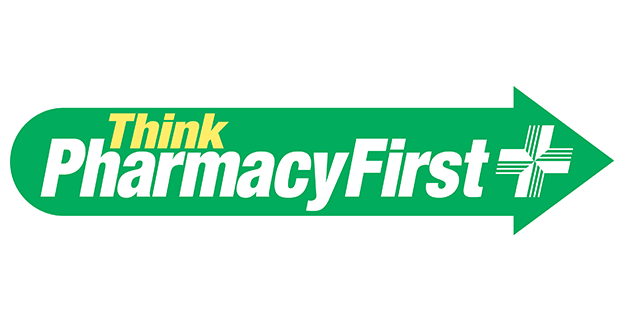Know who to turn to for your healthcare needs
We want to help you get the right medical assistance when you're ill, injured or have a long term condition. Going directly to the correct service with the appropriate skills is important. This can help you to a speedier recovery and makes sure all NHS services are run efficiently.

People often visit their GP with minor illnesses that a local pharmacist could help with. Instead of booking a GP appointment, you can visit your local pharmacy , saving you time and with no appointment needed – you can just walk in.
All pharmacists can give advice and medicine if you need it that will help clear up the problem. If your condition is more serious, they will refer you to your GP.
What’s more, many pharmacies are open in the evenings and on the weekends.
Can I get free treatment?
If you don’t normally pay for your medicines, then you don’t need to pay with Think Pharmacy First – you can get them free and over the counter from your local pharmacist without the need to see your GP.
Which illnesses are included?
Advice from your pharmacist is always free, but thanks to the Think Pharmacy First scheme they can also provide treatment for the minor illnesses below:
Back pain
Headache
Migraine
Period pain
Teething
Toothache
Allergies
Bites and stings
Hay fever
Skin reactions
Cough
Congestion
Colds and flu
Sore throat
Fevers and/or temperature
Earache
Ear wax
Ear infection
Bacterical conjunctivitis (sticky eyes)
Styes
Stomach aches
Constipation
Diarrhoea
Haemorrhoids
Indigestion
Reflux
Threadworm
Vomiting
Skin/mouth problems
Athletes foot
Chickenpox
Cold sores
Contact dermatitis (inflammation of the skin)
Fungal skin infection
Impetigo (blisters)
Nappy rash
Scabies
Skin rash
Vaginal thrush
Warts and verrucae
Head lice
Find your nearest pharmacy
Minor illnesses
Pharmacies can give treatment advice about a range of common conditions and minor injuries, such as:
- aches and pains
- sore throat
- coughs
- colds
- flu
- earache
- cystitis
- skin rashes
- teething
- red eye
If you want to buy an over-the-counter medicine, the pharmacist and their team can help you choose.
Antibiotics will not be available over the counter to treat minor conditions.
What to expect from your pharmacy team
Pharmacists are experts in medicines, and use their clinical expertise, together with their practical knowledge, to advise you on minor health concerns, such as coughs, colds, aches and pains, as well as healthy eating and stopping smoking.
They can help you consider the alternatives next time you’re thinking of making a doctor’s appointment.
You can always call NHS 111, which will help you find the right NHS service.
What services do pharmacies offer?
All pharmacies provide the following services:
- dispensing
- repeat dispensing
- disposal of unwanted or out-of-date medicines
- advice on treatment of minor health concerns and healthy living
Other services that may be available from your local pharmacy:
- Advice on alcohol consumption
- Support for carers
- Chlamydia screening and treatment service
- Condom supply service
- Emergency hormonal contraception service
- Emergency supply of prescription medicines
- Independent prescribing by pharmacists – some pharmacists can now prescribe prescription-only medicines for certain medical conditions
- Medicines use reviews
- Minor ailment service
- Needle and syringe exchange service
- New Medicine Service
- NHS Health Check – blood pressure, cholesterol or blood glucose testing
- Pregnancy testing
- Stop smoking service
- Stop smoking voucher service
- Supervised consumption of prescribed medicines
- Weight management service
Did you know that you could visit the local Pharmacist for a Minor Ailment rather than seeing a GP?
No referral needed, simply walk in and speak to the Pharmacist.
Please be mindful that the Pharmacist may not be able to see you depending on how long you have had the condition.
When to visit an urgent care centre
Urgent treatment centres are a facility you can go to if you need urgent medical attention but it’s not a life-threatening situation. Urgent treatment centres are GP-led and open for at least 12 hours a day every day of the week (including bank holidays). You may be referred to an urgent treatment centre by NHS 111 or by your GP. You can also just turn up and walk in.
Conditions that can be treated at an urgent treatment centre include:
- sprains and strains
- suspected broken limbs
- minor head injuries
- cuts and grazes
- bites and stings
- minor scalds and burns
- ear and throat infections
- skin infections and rashes
- eye problems
- coughs and colds
- feverish illness in adults
- feverish illness in children
- abdominal pain
- vomiting and diarrhoea
- emergency contraception